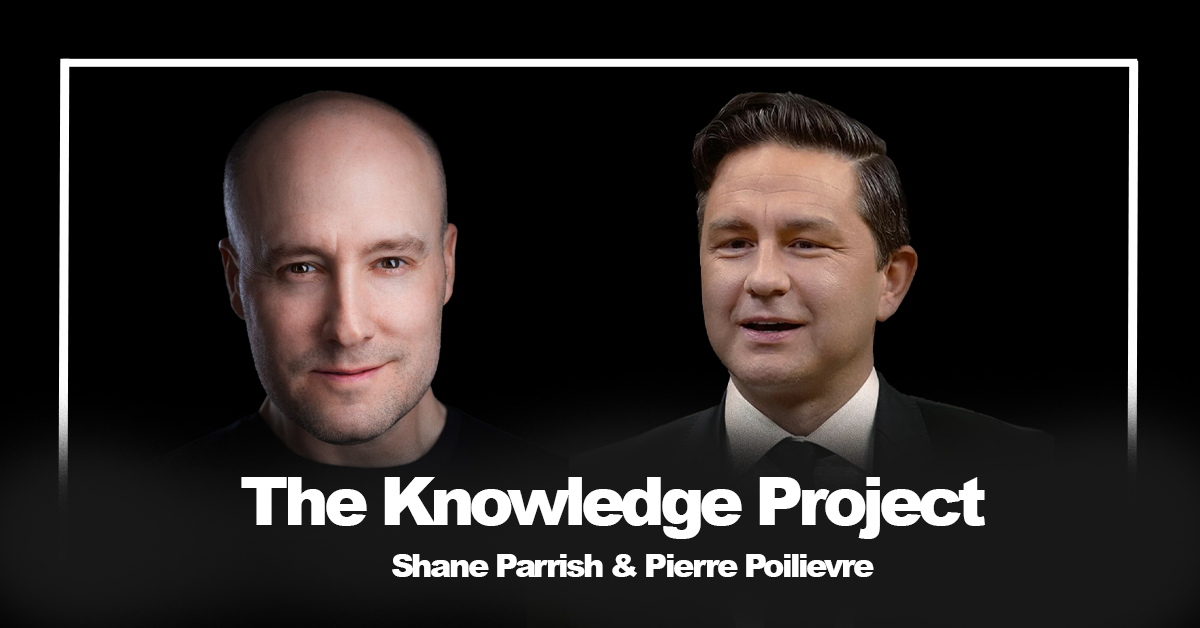This week, the Knowledge Project takes a rare step into the political arena with a special bonus episode featuring Pierre Poilievre, Leader of the Conservative Party of Canada and the Official Opposition. In a world often dominated by angry sound bites and gotcha moments, this conversation aims to explore complex issues affecting Canadians’ daily lives with nuance and good faith.
Shane Parrish sits down with Poilievre to discuss his personal motivations, his approach to unifying a divided country, and his specific plans for tackling key issues like the rising cost of living, housing affordability, healthcare challenges, crime rates, and Canada’s economic competitiveness. They also delve into his stance on controversial topics like carbon taxes, government spending, media subsidies, and free speech in the digital age.
Here are the detailed key insights and takeaways:
1. Personal Motivation: The Canadian Promise
- Core Belief: Poilievre emphasizes his belief in the “Canadian Promise” – the idea that anyone, regardless of their starting point, can achieve success through hard work. He shares his own story of being adopted by school teachers and his wife’s journey as a refugee from Venezuela as examples.
- “Why”: His stated purpose in politics is to restore this promise and give everyone the same chance he had, pushing back against what he sees as forces dividing Canadians.
- Distinctly Canadian: He rejects comparisons to Donald Trump, highlighting differences in background and policy, and emphasizing his Canadian identity and outlook.
2. Uniting the Country: Beyond Identity Politics
- Critique of Division: Poilievre argues the current government intentionally divides people into identity groups to maintain power, fostering hostility. He advocates for treating everyone as individuals based on character and conduct, not group origin.
- Assimilation Reimagined: While welcoming immigrants and their cultures, he stresses the importance of uniting under the Canadian flag and leaving conflicts from abroad behind – a form of assimilation focused on shared national identity.
- Focus on Common Ground: The goal is to unite people around shared aspirations (like achieving the Canadian Promise) rather than emphasizing differences.
3. Economic Strategy: Unleashing Enterprise
- Productivity Gap: Canada creates significantly less economic value per hour worked (
53USD)comparedtotheUS(53USD)comparedtotheUS(78 USD), largely due to lower business investment per worker. - Core Problems: Poilievre identifies high taxes and slow permitting processes (e.g., 17 years for a mine approval vs. faster times in US/UK) as key deterrents to investment.
- Proposed Solutions:
- Cut Taxes: Lower income taxes, cut taxes on investment, energy, work, and home building. Implement a “Canada First Reinvestment Tax Cut” (zero capital gains if profits are reinvested in Canada).
- Speed Up Permits: Make Canada the fastest G7 nation for permits, incentivizing municipalities, removing federal roadblocks (like Bills C-69/C-48), and creating “shovel-ready zones” with pre-approved environmental standards.
- End Carbon Tax: Eliminate the federal carbon tax entirely.
- Free Interprovincial Trade: Remove barriers hindering trade between Canadian provinces.
- Sound Money: Balance the budget to curb inflation.
4. Balancing the Budget & Role of Government
- Fiscal Discipline: Proposes a “dollar-for-dollar law” requiring any new spending to be matched by savings elsewhere, enforced by the Auditor General. Reduce bureaucracy through attrition, cut consulting fees drastically, and end foreign aid and corporate grants.
- Critique of “Expert” Class: Questions the effectiveness of “globe-trotting experts,” arguing that common sense insights from everyday people (farmers, mechanics) are often more accurate. Believes in a humble government that empowers individuals.
- Protecting the Vulnerable: Argues that government growth beyond a basic safety net often transfers wealth from the working class to the rich via inflation and subsidies. Aims to create opportunity from the “bottom up.”
5. Tackling Crime & Addiction
- “Catch and Release”: Criticizes current bail laws (Bill C-75) for allowing repeat offenders back onto the streets quickly. Cites Vancouver data showing 40 offenders arrested 6,000 times.
- Proposed Reforms: Repeal C-75 and house arrest for serious crimes. Implement a “three strikes” law for serious violent offenses leading to permanent ineligibility for bail/parole. Turn jails into “repair shops” focusing on rehabilitation and skills.
- Drug Crisis: Views lack of hope and opportunity as a key driver. Proposes treatment (not just safe injection sites) as the primary solution for addiction, combined with securing borders against drug trafficking (Fentanyl).
6. Healthcare: Focus on Licensing & Innovation
- Protect Universal Care: Committed to the Canada Health Act and ensuring care isn’t denied based on inability to pay.
- Address Shortages: Implement a national testing standard (“Blue Seal”) to quickly license qualified immigrant doctors and nurses (32,000 nurses, thousands of doctors currently unable to work).
- Speed Up Approvals: Recognize drug/treatment approvals from comparable jurisdictions (US/EU) to get advanced medicines to Canadians faster.
7. Free Speech & Media
- Repeal C-11: Eliminate the “censorship law” giving the CRTC power to control online content.
- Against Subsidies: Believes government funding/subsidies for media create bias or the perception of bias. Advocates for a press independent of government control.
- Harmful Content: Argues existing criminal code provisions against incitement to violence/genocide are sufficient. Worries that broad definitions of “harmful content” will stifle legitimate political discourse, especially with the rise of AI/LLMs. Sees toxic ideology often pushed “top-down” through institutions, not just “bottom-up” online.
8. Vision for Canada (Success in 4 Years):
- A place where every child knows they can achieve anything through hard work – from astronaut to curing cancer to owning a home with a dog and kids playing street hockey. Restoring the Canadian Promise.
Final Thought:
Pierre Poilievre presents a vision centered on individual opportunity, fiscal responsibility, and common-sense solutions aimed at restoring hope and prosperity. He argues for a smaller, more focused government that empowers citizens and unleashes the potential of Canada’s resources and people. This conversation provides a detailed look into his specific policy proposals and the philosophy underpinning them.
Learn more: Find information about Pierre Poilievre and the Conservative Party of Canada at conservative.ca (Note: This is the party website; specific campaign sites may vary).
Until next time,
The Podcast Notes Team





